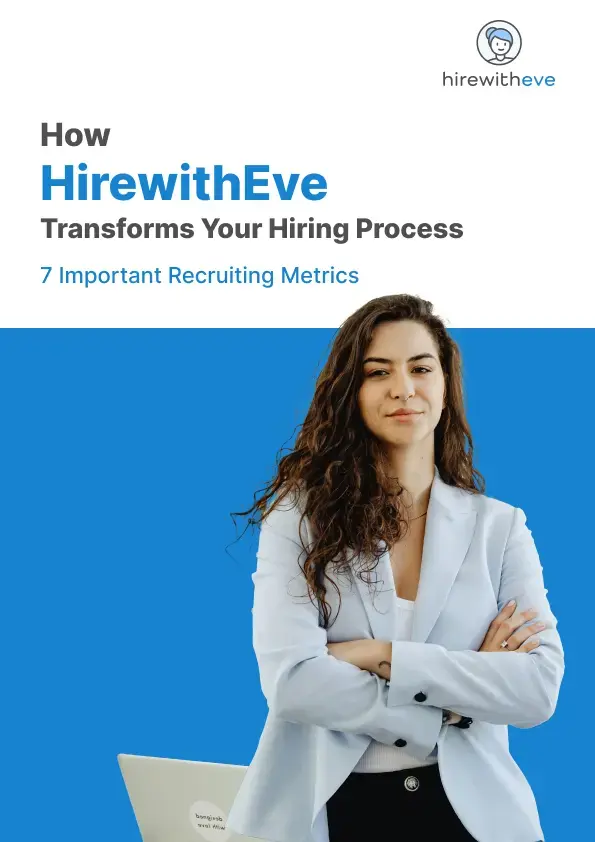Ways Candidates Deceive in Hiring Assessments

Ways Candidates Deceive in Hiring Assessments

In today's increasingly competitive job market, hiring assessments have become a critical part of the talent acquisition process. These assessments are designed to evaluate candidates’ skills, cognitive abilities, and cultural fit. However, as the use of technology in the hiring process grows, so do the ways candidates can cheat or manipulate these assessments. This presents significant challenges for talent acquisition specialists and HR managers who aim to hire the best talent while maintaining the integrity of the hiring process.
In this blog, we will explore the most common ways candidates cheat in hiring assessments, the impact of these actions on your organization's hiring success, and how you can detect and prevent dishonest behavior. Most importantly, we will show how platforms like HirewithEve can help safeguard your hiring process and ensure that you are selecting the right candidates based on skills and merit.
Table of contents
Common Methods of Cheating in Hiring Assessments
Impact of Cheating on the Hiring Process
How to Detect and Prevent Cheating in Hiring Assessments
Why HirewithEve is the Right Solution for Hiring Integrity
Conclusion
Common Methods of Cheating in Hiring Assessments
Cheating in hiring assessments is more prevalent than many HR professionals might realize. As the recruitment process moves increasingly online, candidates are finding new ways to manipulate the system to their advantage. Here are some of the most common methods.
Plagiarism in Written Assignments
One of the simplest and most common forms of cheating is plagiarism, particularly in assessments that require written responses or problem-solving tasks. Candidates can copy answers from the internet or from other applicants, presenting them as their own work.
Impersonation in Virtual Interviews
With the rise of remote work, virtual interviews and assessments have become more common. Impersonation, where someone else takes the test or attends the interview on behalf of the candidate, is another significant issue. This is particularly difficult to detect if the interview is not video-based or if weak identity verification protocols are in place.
Use of External Help During Assessments
Many assessments are conducted online and unsupervised, making it easy for candidates to seek external help. They may use search engines, consult with friends or professionals, or even hire online services to take tests for them.
Technology Manipulation: Browser Extensions and Apps
Candidates can leverage browser extensions or external applications to access prohibited resources during an assessment. Some extensions allow for automatic searching of questions online, while others can help mask internet activity or block monitoring software, helping candidates cheat undetected.
Falsifying Skills and Experience
Finally, one of the oldest methods of cheating is falsifying experience or skill sets on resumes and in interviews. Candidates may inflate their previous job responsibilities or claim expertise in tools and technologies they have limited experience with, relying on generic responses during assessments to cover up their lack of knowledge.
Impact of Cheating on the Hiring Process
The consequences of cheating in hiring assessments extend far beyond simply hiring the wrong candidate. It can lead to:
Decreased productivity: A candidate who cheats through assessments is unlikely to have the necessary skills, leading to lower on-the-job performance.
Increased turnover: Mis-hires cost time and money, and when these candidates inevitably fail to meet expectations, they leave, resulting in high turnover.
Damage to company reputation: Consistently poor hires can tarnish your company's internal and external reputation.
As HR professionals, it is essential to ensure that the assessments you rely on for candidate selection maintain their integrity.
How to Detect and Prevent Cheating in Hiring Assessments
The key to addressing cheating in hiring assessments is prevention, detection, and appropriate responses. By employing modern tools and strategies, HR managers can minimize the risk of hiring unqualified candidates.
Proctoring and Monitoring Tools
Using proctoring tools that monitor candidates during assessments through webcams, screen sharing, and other surveillance technologies can significantly reduce cheating. For example, HirewithEve integrates with various proctoring solutions, offering real-time monitoring and post-assessment analysis to flag suspicious behaviors.
Skills Verification
Verifying the claimed skills of a candidate through practical assessments is another effective way to combat cheating. Rather than relying on self-reported proficiency or resumes, platforms like HirewithEve emphasize skills-based assessments that require candidates to demonstrate their abilities in real-time scenarios, making it harder for them to fake their knowledge.
Data-Driven Insights and Analytics
One of the key ways to detect anomalies in hiring assessments is by leveraging data analytics. HirewithEve offers robust data-driven insights, allowing you to track candidate performance trends and spot inconsistencies that may indicate cheating. For example, if a candidate’s test score is vastly higher than their work history suggests, this can be a red flag worth investigating.
Continuous Learning and Candidate Engagement
Preventing cheating also involves creating a culture where candidates feel motivated to engage genuinely in the hiring process. HirewithEve helps keep candidates engaged by offering continuous learning opportunities and challenges that encourage them to demonstrate their true skills rather than relying on shortcuts.
Why HirewithEve is the Right Solution for Hiring Integrity
As cheating in hiring assessments becomes more sophisticated, so too must the solutions used to prevent it. HirewithEve is a cutting-edge platform that helps ensure hiring integrity with its specialized tools and features. Here’s why HirewithEve is the perfect solution for HR managers and talent acquisition specialists looking to secure their hiring process.
Skills-Based Assessments
The platform offers highly customizable skills-based assessments that challenge candidates in real-world scenarios. This makes it much harder for candidates to cheat, as they are required to actively demonstrate their abilities.
Robust Proctoring Tools
HirewithEve integrates with industry-leading proctoring technologies to monitor candidates during online assessments. Features like screen sharing, webcam monitoring, and suspicious activity flags help detect cheating attempts in real time.
Data Analytics for Candidate Insights
With HirewithEve's advanced analytics, you can track performance data across different stages of the hiring process. This allows you to spot discrepancies or unusual patterns that may indicate dishonest behavior.
Integration with Hiring Platforms
HirewithEve seamlessly integrates with popular ATS systems and other recruitment tools, ensuring that the hiring process remains smooth and efficient. This allows HR teams to use the platform’s anti-cheating tools alongside their existing systems, streamlining the workflow.
Conclusion
Cheating in hiring assessments is a growing concern for HR professionals, but it can be addressed with the right strategies and tools. From plagiarism and impersonation to the use of technology for cheating, the risks are real and can undermine the integrity of your hiring process. However, with platforms like HirewithEve, talent acquisition specialists can mitigate these risks and ensure they are hiring the best candidates based on genuine skills and merit.
Target Your Talent
Unlock tailored solutions for your recruitment and hiring needs with Eve Platform's extensive case study library.
Subscribe now to enhance your HR expertise and excel in your role.
Free Resources

Transforming Hiring: 7 Key Recruiting Metrics
Enhancing recruitment processes with data-driven insights for better hiring outcomes.

Reducing Hiring Bias with Hirewitheve.
Utilizing Hirewitheve to combat bias and streamline recruitment processes effectively.

Hiring Detail-Oriented Candidates
HirewithEve enhances hiring by accurately assessing candidate's attention to detail-oriented.
